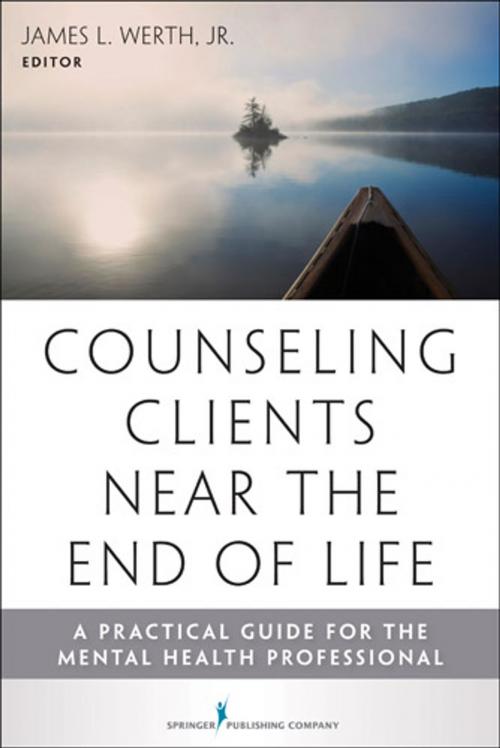Counseling Clients Near the End of Life
A Practical Guide for Mental Health Professionals
Nonfiction, Social & Cultural Studies, Social Science, Cultural Studies, Death & Dying, Health & Well Being, Psychology, Counselling, Family & Relationships, Family Relationships, Death/Grief/Bereavement| Author: | ISBN: | 9780826108500 | |
| Publisher: | Springer Publishing Company | Publication: | December 5, 2012 |
| Imprint: | Springer Publishing Company | Language: | English |
| Author: | |
| ISBN: | 9780826108500 |
| Publisher: | Springer Publishing Company |
| Publication: | December 5, 2012 |
| Imprint: | Springer Publishing Company |
| Language: | English |
"I found this book to be a well-written, sensitively presented, and important resource for those engaged in this critical area of work. Thank you, Dr. Werth, for making such a substantial contribution to this field."--Journal of Palliative Care
"[This book offers] over 20 contributors, all with impeccable credentials, covering many perspectives that we need to consider more frequently and in greater depth...There is much that awaits you in this book."--Illness, Crisis, and Loss
"Counseling Clients Near the End of Life is a marvelous resource for mental health providers who are searching for useful information in areas such as the following: resolving ethical dilemmas; assisting clients in planning for the end of life; counseling caregivers of clients who are near the end of life; and assisting people in dealing with grief. The editor of this work, Dr. James Werth, has done a splendid job of gathering various experts to share their perspectives on end of life care and choices at this time of life--and he has also written an excellent chapter on counseling clients who are dying."
Gerald Corey, EdD, ABPP
Professor Emeritus of Human Services and Counseling
California State University, Fullerton
This highly accessible guide to counseling people who are terminally ill and their families fills a critical need in the counseling literature. Written for front-line mental health professionals and counseling graduate students, the text integrates research with practical guidance. It is replete with the experiences of contributing authors who are leaders in counseling terminally ill individuals , real-life case examples, clinical pearls of wisdom, and tables of practice pointers that provide quick access to valuable knowledge.
The text offers information that is requisite for all counselors who provide services to persons who are terminally ill and their families. It addresses common issues that influence different types of counseling approaches, such as how the age, ethnicity, or religion of a client affects counselor conceptualizations and actions. The book discusses how to manage symptoms of depression, anxiety, and cognitive impairment near the end of life. It explains how advance directives can be used to assist dying individuals and their loved ones. The counseling needs of family members before and after death are addressed as well as counseling loved ones experiencing complicated grief. The text also examines the particular concerns of counselors regarding self-care and the benefits of working as part of a professional team. Woven throughout are important considerations such as cultural diversity, ethical challenges, laws, and regulations; and advocacy at client and social policy levels. Readers will also benefit from the inclusion of additional references for more in-depth study.
Key Features:
- Integrates research with practical and accessible information
- Provides clinical ìpearlsî that can be put to use immediately
- Provides a reader-friendly format that includes real-life case studies and tables with important pointers
- Describes the counseling experiences of leading practitioners that include examples of successful and unsuccessful interventions
- Based on a comprehensive framework developed by a Working Group of the American Psychological Association
"I found this book to be a well-written, sensitively presented, and important resource for those engaged in this critical area of work. Thank you, Dr. Werth, for making such a substantial contribution to this field."--Journal of Palliative Care
"[This book offers] over 20 contributors, all with impeccable credentials, covering many perspectives that we need to consider more frequently and in greater depth...There is much that awaits you in this book."--Illness, Crisis, and Loss
"Counseling Clients Near the End of Life is a marvelous resource for mental health providers who are searching for useful information in areas such as the following: resolving ethical dilemmas; assisting clients in planning for the end of life; counseling caregivers of clients who are near the end of life; and assisting people in dealing with grief. The editor of this work, Dr. James Werth, has done a splendid job of gathering various experts to share their perspectives on end of life care and choices at this time of life--and he has also written an excellent chapter on counseling clients who are dying."
Gerald Corey, EdD, ABPP
Professor Emeritus of Human Services and Counseling
California State University, Fullerton
This highly accessible guide to counseling people who are terminally ill and their families fills a critical need in the counseling literature. Written for front-line mental health professionals and counseling graduate students, the text integrates research with practical guidance. It is replete with the experiences of contributing authors who are leaders in counseling terminally ill individuals , real-life case examples, clinical pearls of wisdom, and tables of practice pointers that provide quick access to valuable knowledge.
The text offers information that is requisite for all counselors who provide services to persons who are terminally ill and their families. It addresses common issues that influence different types of counseling approaches, such as how the age, ethnicity, or religion of a client affects counselor conceptualizations and actions. The book discusses how to manage symptoms of depression, anxiety, and cognitive impairment near the end of life. It explains how advance directives can be used to assist dying individuals and their loved ones. The counseling needs of family members before and after death are addressed as well as counseling loved ones experiencing complicated grief. The text also examines the particular concerns of counselors regarding self-care and the benefits of working as part of a professional team. Woven throughout are important considerations such as cultural diversity, ethical challenges, laws, and regulations; and advocacy at client and social policy levels. Readers will also benefit from the inclusion of additional references for more in-depth study.
Key Features:
- Integrates research with practical and accessible information
- Provides clinical ìpearlsî that can be put to use immediately
- Provides a reader-friendly format that includes real-life case studies and tables with important pointers
- Describes the counseling experiences of leading practitioners that include examples of successful and unsuccessful interventions
- Based on a comprehensive framework developed by a Working Group of the American Psychological Association















